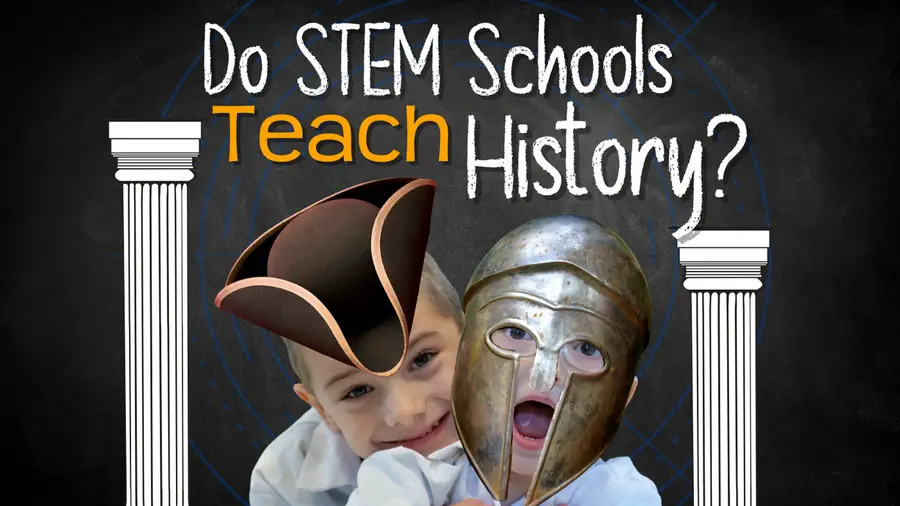STEM schools are equipping young children with all the skills required to thrive in the modern workplace through an alternative approach to education. However, not all children are naturally inclined to be interested in science or building things, and many parents still prefer to offer their children a traditional education. So, do STEM schools teach history and other social sciences or arts courses?
While most STEM schools do not offer history, among other arts modules in their curricula, a new creatively focused alternative, STEAM (Science, Technology, Engineering, Arts, and Mathematics), has emerged incorporating subjects like history, social sciences, language arts as well as art and music.

There has long since been an agreed-upon consensus that the prospective jobs of the future are most promising in STEM fields. However, some feel concerned that emphasis on STEM subjects could detract from students’ overall education. Without an adequate understanding of history, humanities, and art students may be less equipped to understand the world around them and communicate their ideas.
How does History Fit in STEM Skills?
History is often regarded as a subject with no demonstrable value. After all, how many times at work have you had to recall (or Google) some kind of historical event? How does knowing ancient history or memorizing dates help solve real world problems? Unless you’re a journalist, an author, or some kind of civil activist, it’s unlikely that it’s professionally necessary for you to understand history, right?
With modern technology giving us instant access to information and communication, we take many things for granted. We tend to forget that every scientific achievement, breakthrough, or technological advancement today is owed to the achievements of far greater persons throughout history. How can we understand physics without learning about Isaac Newton?
How do we use binary code to run our computers without the number zero, which first gained its “status” as a number in the seventh century in the works of Indian astronomer and mathematician Brahmagupta? How well would our technology work without the computational breakthrough of pioneers like Ada Lovelace or Grace Hopper?
For a great illustration of how history meets science to shape our world, I invite you to go down the rabbit hole of Connections with James Burke. It’s a series that take historical events and discoveries and explores how these ripple through time and change everything. Fascinating stuff. At least check out the first few minutes to see what I mean:
Everything from smartphones to electronic vehicles to the Internet to drones to Artificial Intelligence cannot exist without basic scientific foundations. Without history, we run the risk of spinning our wheels repeating the past instead of learning from the mistakes others have already made. We may also miss exposure to the origins of many theories and how they led to the rapid development of technologies taking place today.
Therefore, learning about the great scientists like Newton, Einstein, Archimedes, and even as far back as “the father of science himself”, Aristotle, will play a fundamental role in a student’s ability to fully grasp, understand, and thrive in a STEM-focused environment.
Why History Matters
“If I have seen further than others, it is by standing on the shoulders of giants.”
– Isaac Newton
Every single human achievement ever made is a consequence of someone else’s hard work. Henry Ford, for example, may never have invented the Model T Ford if not for the invention of the wheel centuries earlier, or the invention of the internal combustion engine, and so on.
In fact, all inventions can be traced back and found to be a reiteration of two of the two most fundamental technological advancements and scientific discoveries. Firstly, the wheel is fundamental for everything from car wheels to the gears in heavy machinery. Similarly, without the discovery of fire we wouldn’t have learned to cook meat, use steam engines, forge iron, create chemical reactions, and everything in between.
This may seem like an over-exaggeration, but hear me out. Let’s follow the logic. One of the 20th Century’s greatest thinkers, Thomas Kuhn, an American philosopher of science, discusses the Post-Structure Philosophy, which dictates the concept of paradigm shifts and focuses on the semantics of various scientific theories. The core argument is that “science” is in a state of constant flux. One scientist’s achievements (or breakthroughs) affect the entire field. (Again, go check out the Connections video above.)
Figures like Newton, Einstein, Stephen Hawking, etc., come up with theories that lead to a paradigm shift and a reconceptualization of the scientific discipline as a whole.
Einstein’s theory of relativity changed the nature of the entire world, in fact, given that his discoveries gave rise to the Manhattan Project, which led to the creation of the atomic bomb, ended World War II, and kick started The Cold War: History. Science. Chain reactions.
There are countless examples of how scientific breakthroughs have reverberated through history, making us question scientific facts themselves and reshaping the world we live in.
And, beyond this, STEM fields do not exist in a bubble. The world is affected by science just as much as science is affected by the world in which it exists. So, we need to understand history; we need to know how major historical events like colonial expansion, World War I, and World War II were caused by the Industrial Revolution… How the Industrial Revolution shaped our education system and gave us the public schools we have today… how agriculture gave birth to the majority of our great civilizations… and also, about the mistakes that many scientists from the past have made.
Social Science and STEM
Ethics are critical for science; we know there will come a time where Artificial Intelligence, human cloning, and other scientific advancements will give us god-like powers. We will have to shoulder the responsibility of yielding this great power (with great power comes great responsibility, right?) It’s going to require years, even decades of philosophical debate over complex ethical dilemmas. Some of these debates are already happening.
Failing to consider the consequences of the advancements we’ve made or will be making can be catastrophic. Take the eugenics and scientific racism theories, inspired by Charles Darwin’s Theory of Evolution, as an example. It led to the propagation of slavery and the eugenics practiced by Nazis, leading to genocide. Without studying history, we cannot learn from these mistakes and will be doomed to repeat them.
In a fast-paced world that is under existential threat from phenomena such as climate change, we will be looking to science for swift answers to some of humanity’s greatest problems. But we also need our scientists and engineers to make considered, practical decisions that take more than pure science into the equation for the decision-making process.
Even though STEM subjects and history appear to be separated from one another, due to the vast differences in the subject matter, without history, science is lost.
STEAM: Towards A Better Rounded Education
STEAM education takes an approach to education with specific focuses on subjects related to Science, Technology, Engineering, Arts, and Mathematics. In STEAM schools, a student who may not have the same aptitude for the sciences and prefers literature or creative pursuits have the opportunity to take electives such as English Language Arts (ELA) or a foreign language to focus on communication skills (or art or music.)
Related Post: Do STEM Schools Teach English or Language Arts?
Students who do show an aptitude for science have an opportunity to explore beyond their field of specialization, challenge themselves at what they may consider more difficult subjects, and get a broader understanding of the world around them and the social sciences.
Should You Send Your Child To A STEAM School?
The demand for workers in STEM fields, particularly in the United States, is sky-high at the moment and looks set to grow tremendously in the years to come. There’s no question that it will help a child’s prospects if their parents opt to give them a STEM education.
However, some kids do not necessarily have the aptitude (or interest) for STEM education. Not everyone needs to be a computer scientist or engineer. As a society – as a civilization – we would be ignoring the arts at our peril. If you want the best STEM education has to offer with a blend of the arts, you may consider finding a STEAM school for your children.
Related Post: STEM 101: What every parent needs to know about STEM education
Wrap Up – Do STEM Schools Teach History
If you’re wondering, “Do STEM schools teach history,” you’ll be hard pressed to find traditional history courses in standard STEM curriculum. STEAM integrates arts and social sciences into the mix along with science, technology, engineering, and math. STEM education is evolving; STEM and STEAM have the same goals to provide students with the best education and best chance at landing a career where they can make an impact and be successful.
Read more about STEM education in our post STEM Education 101: What every Parent Must Know


